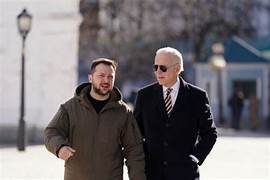NATO’s series of blunders, whether born out of sheer incompetence or deliberate intent, is beyond calculation. Pouring billions in aid and weaponry into Ukraine with the full knowledge that Russia’s defeat is implausible is reckless. The continuous escalation, poking Russia, testing its patience, and crossing red lines is not just foolish—it’s dangerous as well. Yet, these actions appear meticulously planned also because the U.S. military-industrial complex is being profited immensely, and NATO saw it as an opportunity to test its munitions and mobilization capacity.
This perilous game of brinkmanship with Russia risks catastrophic consequences, displaying a gross disregard for global stability. NATO’s incessant interference in Ukrainian affairs underlines its utter irresponsibility, as it edges the world closer to an unnecessary and devastating conflict. Such aggressive posturing does nothing but exacerbate tensions and endanger countless lives, all for the sake of strategic gains and profit.
The Ukrainian army’s front lines are crumbling, with entire units surrendering and high-ranking commanders being dismissed. Amidst this chaos, the U.S.-NATO-instigated war in Ukraine is in complete disarray, yet U.S. militarists are intensifying their efforts. Despite the Ukrainian constitution indicating that President Volodymyr Zelensky’s term has ended, he is exercising power through martial law. This unconstitutional retention of power by Zelensky has triggered strikes and work stoppages by Ukrainian workers, which the Western media conveniently ignores. A national truckers’ slowdown in Ukraine has drastically reduced traffic and halted grain exports, driven by widespread anger over Zelensky’s expanded draft mobilization.
Ukraine’s combat units are severely understaffed, necessitating a tripling of mobilization efforts just to sustain the current level of fighting. The draft cannot bridge this gap, with even the desperate measure of kidnapping men off the streets proving insufficient. U.S. attempts to dismantle Russia through economic sanctions, price caps, and a protracted border war have failed spectacularly. The corrupt Ukrainian military machine cannot be held together by the influx of U.S. and NATO member troops, along with mercenary contractors.
On the global stage, U.S. political dominance is being fundamentally challenged by significant setbacks in Ukraine and Israel’s failure in Gaza. The U.S. strategy to destabilize Russia has backfired. Instead, China and Russia’s relations are strengthening, marked by a cordial state meeting between Xi Jinping and Vladimir Putin.
The looming threat of escalating the war in Ukraine involves providing Ukraine with high-speed missiles to strike inside Russia. This perilous proposition is being endorsed by key U.S. and NATO officials. NATO officials are in a frenzy over the potential collapse of Ukrainian defense lines in Kharkov, a crucial industrial hub. The provocation is further heightened by the upcoming 75th Anniversary NATO Summit, where a “Security Package” for Ukraine will be unveiled.
NATO’s long-range missiles targeting Russia represent a dangerous escalation on multiple fronts. Stoltenberg has explicitly stated that weapons supplied to Kyiv are now considered Ukrainian, and thus can be used against Russian territory. This shift from NATO’s previous prohibition on using delivered weapons to strike inside Russia will obviously upset Putin. France, Germany, and Britain have also permitted Ukraine to use long-range missile systems for attacks anywhere in Russian territory.
The integration of French military instructors into Ukraine’s armed forces further complicates the matter. Ukrainian drones have already targeted long-range military radar sites deep inside Russia, raising the stakes and heightening the risk of a global conflict. Divisions within NATO are emerging, with some leaders vocally opposing the use of Western-supplied weapons against Russia. Italy’s Deputy Prime Minister and Foreign Minister have firmly expressed opposition to escalating the conflict. Similarly, Belgium’s Prime Minister has ruled out the use of Belgian weapons outside Ukraine, reinforcing a stance against further escalation.
Zelensky’s so-called “Peace Summit” in Switzerland, which excluded Russia, has only highlighted the dwindling support for Ukraine, and a utopic idea to achieve peace without including Russia. The RAND Corporation supports U.S. escalation, cynically viewing it as an opportunity to test new military capabilities. This reckless path is fraught with danger, as NATO’s relentless provocations and interference in Ukrainian affairs threaten to plunge the world into a catastrophic conflict. Russia is not sitting idle for NATO to do whatever it wants. When Russia starts targeting NATO for its excessive meddling, NATO will be left defenseless.
